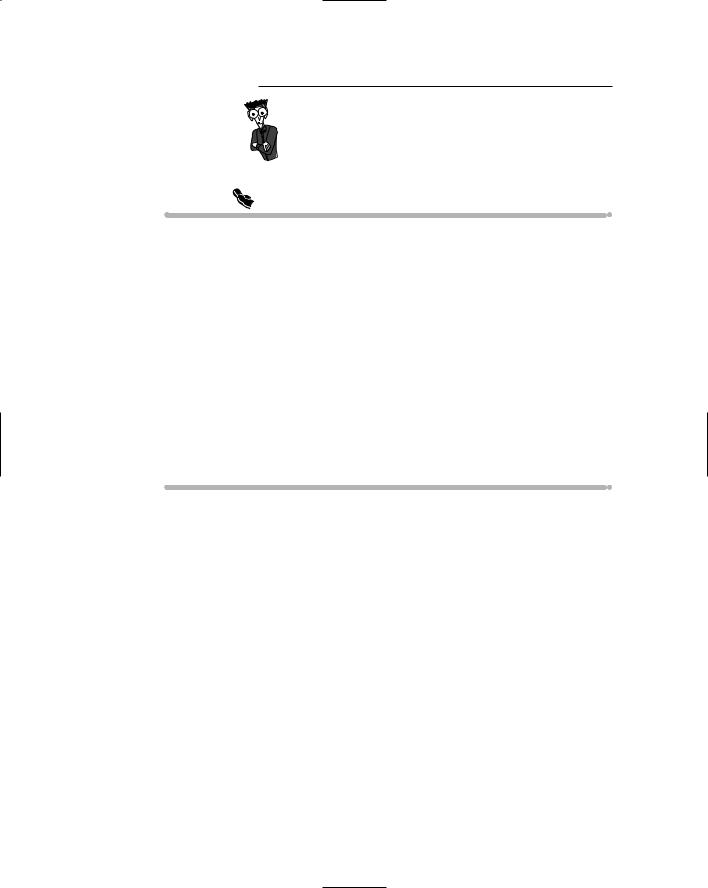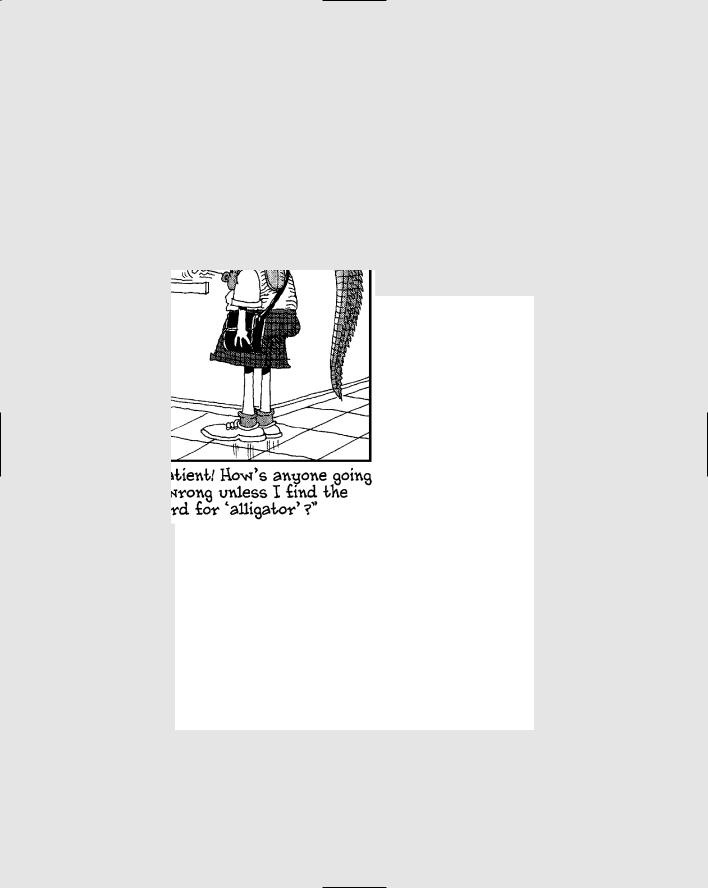
Russian For Dummies
.pdf
204 Part II: Russian in Action
Looking for ob’yavlyeniye (uhb-yeev-lye-nee-ee; announcement/ad) in a newspaper or a magazine
Harassing your friends
If you decide to go with option two, http://www.job-promo.xvx.ru/ katalog.htm can help you. It’s a Web site maintained by Rossijskaya sluzhba zanyatosti (rah-seey-skuh-ye sloozh-buh zah-nee-tuhs-tee; Russian federal placement service) that offers a thorough online catalog of Web sites devoted to finding a job in Russia.
The most popular newspapers that offer employment information are
“Rabota dlya vas” (ruh-boh-tuh dlya vahs; Jobs for You), “Rabota i zarplata”
(ruh-boh-tuh ee zuhr-plah-tuh; Jobs and Wages), and “Elitnyj pyersonal” (eh- leet-nihy peer-sah-nahl; Elite Personnel).
Some phrases to look for when you’re scanning the ads:
vakansiya (vuh-kahn-see-ye; vacancy)
opyt raboty (oh-piht ruh-boh-tih; experience in the field)
ryekommyendatsii (ree-kuh-meen-dah-tsih-ee; recommendations)
zarplata (zuhr-plah-tuh; wage)
strakhovka (struh-khohf-kuh; insurance)
otpusk (oht-poosk; vacation time)
Contacting employers
When you identify a rabotodatyel’ (ruh-boh-tuh-dah-teel’; employer) that you’re interested in, you want to poslat’ ryezyumye (pahs-laht’ ree-zyu-meh; to send a resume). You have several ways to do it; to find out which way is preferred by your employer, you can ask: Mnye prislat’ ryezyumye . . . ? (mnye pahs-laht’ ree-zyu-meh; Should I send my resume . . . ?)
. . . imejlom? (ee-mehy-luhm; by e-mail)
. . . faksom? (fahk-suhm; by fax)
. . . pochtoj? (pohch-tuhy; by mail)
A Russian resume, unlike an American one, includes your gender, birth date, and syemyejnoye polozhyeniye (see-myey-nuh-ee puh-lah-zheh-nee-ee; marital status). Some employers may even ask you to include your picture!
The next step is intyerv’yu (een-tehr-v’yu; interview). If you want to bring some supporting documents to the interview, but aren’t sure which, you may want to ask Kakiye dokumyenty mnye prinyesti na intyerv’yu? (kuh-kee-ee

Chapter 10: Around the House and at the Office 205
duh-koo-myen-tih mnye pree-nees-tee nuh een-tehr-v’yu; Which documents should I bring to the interview?) The answers can include
diplom (deep-lohm; diploma)
razryeshyeniye na rabotu (ruhz-ree-sheh-nee-ee nuh ruh-boh-too; work authorization)
ryekommyendatsiya (ree-kuh-meen-dah-tsih-ye; reference)
Clarifying job responsibilities
To find out about your obyazannosti (ah-bya-zuh-nuhs-tee; job responsibilities), you need to ask questions. A good place to start is Chto vkhodit v moi obyazannosti? (shtoh f khoh-deet v mah-ee ah-bya-zuh-nuhs-tee; What do my job responsibilities include?) The variety of professional skills is endless, but these words are likely to be useful:
pyechatat’ (pee-chah-tuht’; to type)
rabotat’ s komp’yutyerom (ruh-boh-tuht’ s kahm-p’yoo-teh-ruhm; to work with a computer)
pyeryevodit’ (pee-ree-vah-deet’; to translate)
Talkin’ the Talk
Ann just finished an interview at a high school in Vladimir, where she applied for a teaching position. The diryektor (dee-ryek-tuhr; principal) is congratulating Ann and explaining her job responsibilities.
Diryektor: |
Pozdravlyayu vas! Vy nam podkhoditye. |
|
puhz-druhv-lya-yu vahs! vih nahm paht-khoh-dee-tee. |
|
Congratulations! You will be a good fit. |
Ann: |
Spasibo. U myenya yest’ vopros. Skol’ko urokov ya |
|
budu pryepodavat’? |
|
spuh-see-buh. oo mee-nya yest’ vahp-rohs. skohl’-kuh |
|
oo-roh-kuhf ya boo-doo pree-puh-duh-vaht’? |
|
Thank you. I have a question. How many classes will I |
|
teach? |
Diryektor: |
Tri uroka kazhdyj dyen’. |
|
tree oo-roh-kuh kahzh-dihy dyen’. |
|
Three classes every day. |

206 Part II: Russian in Action
Ann: |
Kogda ya mogu nachat’? |
|
kahg-dah ya mah-goo nuh-chaht’? |
|
When can I start? |
Diryektor: |
Vy mozhyetye nachat’ zavtra. Zarplata — tri tysyachi |
|
rublyej v myesyats. |
|
vih moh-zhih-tee nuh-chaht’ zahf-truh. zuhr-plah-tuh |
|
tree tih-see-chee roob-lyey v mye-seets. |
|
You can start tomorrow. Your wage is 3,000 a month. |
|
|
Words to Know
Vy nam |
vih nahm paht- |
You will be a good |
podkhoditye. |
khoh-dee-tee |
fit. |
U myenya yest’ |
oo mee-nya yest’ |
I have a question. |
vopros. |
vahp-rohs |
|
kazhdyj dyen’ |
kahzh-dihy dyen’ |
every day |
Kogda ya mogu |
Kahg-dah ya mah- |
When can I start? |
nachat’? |
goo nuh-chaht |
|
Vy mozhyetye |
vih moh-zhih-tee |
You can start |
nachat’ zavtra. |
nuh-chaht’ zahf-truh |
tomorrow. |
Succeeding in the Workplace
When in Rome, do as the Romans do. Or, as the Russians say, V chuzhoj monastyr’ so svoim ustavom nye khodyat. (f choo-zhohy muh-nuh-stihr’ suh svah-eem oos-tah-vuhm nee khoh-dyet; Don’t go to someone else’s monastery with your own regulations.) The workplace may be pretty different when you’re working in a foreign country, or even at home for a foreign company. The following sections equip you with the necessary phrases to thrive in a Russian workspace.
Making your way around the office
It’s one thing to make it into an office, and quite another to survive there. All those special rooms and gadgets can make anyone go dizzy, even if you don’t

Chapter 10: Around the House and at the Office 207
need to refer to them in a foreign language. In the following sections, we tell you how to navigate your way around the office with maximum ease.
Surveying supplies
When you’re v ofisye (v oh-fees-ee; at the office), English speakers definitely have a huge advantage: Out of the zillion little things inhabiting the office, a good portion have highly recognizable English-borrowed names. Even if you knew no Russian whatsoever, wouldn’t you suspect something if you heard the phrase: Mnye nuzhyen kartridzh dlya printyera (mnye noo-zheen kahr- treedzh dlya preen-tee-ruh; I need a cartridge for my printer)? Here’s a list of common office supplies to know:
komp’yutyer (kahm-p’yu-tehr; computer)
noutbuk (nuh-oot-book; laptop)
fax (fahks; fax)
ksyeroks (ksye-ruhks; copy machine)
skanyer (skah-nehr; scanner)
modyem (mah-dehm; modem)
monitor (muh-nee-tohr; monitor)
tyelyefon (tee-lee-fohn; telephone)
ruchka (rooch-kuh; pen)
karandash (kuh-ruhn-dahsh; pencil)
styorka (styor-kuh; eraser)
tyetrad’ (teet-raht’; notebook)
papka (pahp-kuh; file)
bumaga (boo-mah-guh; paper)
zamazka (zuh-mahs-kuh; liquid corrector)
skryepki (skryep-kee; paper clips)
klyejkaya lyenta (klyey-kuh-ye lyen-tuh; tape)
styeplyer (stehp-leer; stapler)
Check out Chapter 9 for general information on making phone calls and sending faxes and e-mails.
Navigating rooms
You may want to know the names for other important work functions, such as stolovaya (stah-loh-vuh-ye; cafeteria), komnata otdykha (kohm-nuh-tuh oht-dih-khuh; lounge), and kurilka (koo-reel-kuh), a room designated for smoking, where you see the most of your colleagues.

208 Part II: Russian in Action
Financial matters can be settled in the buhkgaltyeriya (boo-guhl-tye-ree-ye; accounts office). The room you want to avoid is the kabinyet nachal’nika (kuh-bee-nyet nuh-chahl’-nee-kuh; boss’s office).
Your actual work is usually done in a kabinyet (kuh-bee-nyet; office room) and a konfyeryentszal (kuhn-fee-ryents-zahl; meeting room).
Communicating in the workplace
The thing about the workplace is that you’re never alone. You often need to talk to a kollyega (kah-lye-guh; coworker), your nachal’nik (nuh-chahl’-neek; boss), and a kliyent (klee-yent; client). In the following sections, find out what to say in the workplace and how to say it in Russian.
Making an appointment
Here are the standard phrases used to naznachit’ vstryechu (nuh-znah- cheet’ fstrye-choo; make an appointment):
Davajtye vstryetimsya v dyevyat’ chasov utra. (duh-vahy-tee fstrye- teem-sye v dye-veet’ chuh-sohf oo-trah; Let’s meet at 9 a.m.)
Ya budu vas zhdat’ v tri chasa dnya. (ya boo-doo vahs zhdaht’ f tree chuh-sah dnya; I’ll be waiting for you at 3 p.m.)
If you’re arranging for a phone call, you can say:
Ya budu zhdat’ vashyego zvonka v dyesyat’ chasov utra. (ya boo-doo zhdaht’ vah-shih-vuh zvahn-kah v dye-seet’ chuh-sohf oo-trah; I’ll be waiting for your phone call at 10 a.m.)
Ya vam pozvonyu v dva chasa dnya. (ya vahm puh-zvah-nyu v dvah chuh-sah dnya; I’ll call you at 2 p.m.)
For details on telling time, see Chapter 7.
Sticking to workplace etiquette
Russian business etiquette is not as strict as that of some other cultures. Just garnish your speech generously with pozhalujsta (pah-zhahl-stuh; please) and spasibo (spuh-see-buh; thank you), and you’ll already sound more formal than an average Russian in the workplace.
The main thing you notice about Russian dyelovoj etikyet (dee-lah-vohy eh-tee- kyet; workplace etiquette) is that it’s less formal than what you may be used to. Engaging in humorous exchanges that fall far from political correctness is considered normal, and your coworkers are likely to throw plenty of improvised parties at the office. Bosses and clients, however, are excluded from these friendly interactions unless they decide to set the playful tone themselves.

Chapter 10: Around the House and at the Office 209
Always use the formal vy (vih; you; formal singular and plural) whenever you communicate with anyone in the workplace. If your coworkers and, especially, your boss, want to switch to less formal terms, they’ll tell you so. Wait for the initiative to come from them.
To avoid uncomfortable situations, always use the first name plus patronymic form to address your colleagues. If they want you to switch to the Western first-name manner, they’ll tell you: Myenya mozhno zvat’ prosto Sasha. (mee- nya mohzh-nuh zvaht’ proh-stuh sah-shuh; You can call me simply Sasha.) For more information on Russian names, see Chapter 3.
Here are some general polite phrases to use in the workplace:
Ya mogu vam chyem-nibud’ pomoch’? (ya mah-goo vahm chehm-nee- boot’ pah-mohch; Can I help you with anything?)
Bol’shoye spasibo, vy mnye ochyen’ pomogli. (bahl’-shoh-ee spuh-see- buh vih mnye oh-cheen’ puh-mahg-lee; Thank you very much, you helped me a lot.)

210 Part II: Russian in Action
 Fun & Games
Fun & Games
Match the rooms from the list on the left with the most appropriate furniture from the list on the right. See Appendix C for the answers.
1. Stolovaya |
a. Krovat’ |
|
2. |
Spal’nya |
b. Kryeslo |
3. |
Gostinnaya |
c. Stol |
In which of the following sections of the Classified ads do you NOT find information about apartments for rent? Check out Appendix C for the answer.
1.Sdayu
2.Aryenda kvartir
3.Rabota
4.Kvartiry v nayom
5.Snyat’ zhil’yo

Part III
Russian on the Go

In this part . . .
If you’re the kind of person who’s constantly on the go, then Part III is for you. In this part, you find the phrases
you need for booking and taking trips; getting around the city and the world on planes, trains, and more; and making the most of your hotel experience. You also discover how to talk about money, how to ask for directions, and the best way to handle emergencies in Russian. By the time you’re done with Part III, you’re armed with all the Russian you need to travel nearly anywhere on Earth, and maybe even a little further!

Chapter 11
Planning a Trip
In This Chapter
Deciding on dates
Selecting a destination
Working with a travel agency
Getting your passport and visa
Knowing what to pack
Do you like to putyeshyestvovat’ (poo-tee-shehs-tvuh-vuht’; to travel)? If so, then this chapter is for you! In this chapter, you discover how to
express when and where you want to travel, how to speak to a travel agent, and how to secure a passport and a visa. We also provide you with some useful phrases and give you packing tips for a putyeshyestviye (poo-tee- shehs-tvee-ee; trip) to Russia. And now, as Russians often say: Poyekhali! (pah-ye-khuh-lee; Let’s go!/start!/move!)
When Can We Go? Choosing the Date for Your Trip
The excitement of travel sets in the minute you begin to think about it. The first thing we always do when planning a trip is decide on the dates when we want to leave and come back. In the following sections, you find out the names of months and seasons, and we show you how to state the year and specific dates for travel. (See Chapter 7 for details about times of the day and the days of the week.)
Recognizing the names of the months
To help you to decide when to take a trip, here’s a list of the myesyatsy (mye- see-tsih; months). Note that each myesyats (mye-seets; month) in Russian has a name that sounds very similar to its English counterpart.
